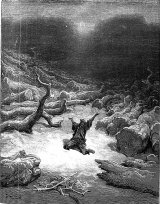The Woodman and Mercury
"The Woodman and Mercury" is a morality fable by Jean de La Fontaine. The story features a woodcutter who loses his axe in a river and is given a golden and a silver axe by Mercury, the god of trade. The honest woodman refuses both, stating that his axe was made of simple iron. Touched by the woodman's honesty, Mercury rewards him with all three axes. The tale underlines the virtue of honesty and how it can be rewarded.
TO M. THE COUNT DE B----. Your taste has always been to me a guide; I've sought in many ways to win your vote: Fastidious cares you often would deride, Forbad me on vain ornament to dote. I think with you an author wastes his days, Who tries with over-care his tale to tell; Yet, it's not wise to banish certain traits Of subtle grace, that you and I love well. With Æsop's aim, I simply do my best; And fail--well, just as little as I can. Try to instruct by reasoning or jest; No fault of mine if no one likes my plan. Rude strength is not by any means my forte; I seek to pelt, with playful ridicule, Folly and vice; and tease the motley fool With stinging missiles--any way, in short; Not having brawny arms, like Hercules. That is my only talent, that I know. I have no strength to stem the angry seas, Or set all honest people in a glow. Sometimes I try to paint in fabled guise, A foolish vanity, with envy blended; Two of life's pivots, mocked at by the wise, In satires long ago, and not yet ended. Such, was the miserable creature, Mean and poor in shape, in feature, That tried to puff herself into an ox. Sometimes I try, by playful paradox, To pair a vice with virtue, folly with good sense, Lambs with gaunt wolves, the ant to match the fly; Everywhere laughing at the fool's expense, I mould my work into a comedy, With countless acts, the universe its scene, Boundless as the blue serene. Men, gods, and brutes each play their part, With more or less of truth and art. Jove like the rest--come, Mercury; Ah! look, why there he comes, I see; The messenger who's wont to bear Jove's frequent errands to the fair-- But more of that another day. A Woodman's axe had gone astray, The winner of his bread was gone; And he sat moaning all alone. He had no wealth to buy such things: The axe his clothes and dinner brings. Hopeless, and in a murky place, He sat, the tears ran down his face. "My own, my poor old axe! Ah! me, Great Jupiter, I pray to thee; But give it back from down below, And I will strike for thee a blow." His prayer was in Olympus heard; Mercury entered at the word. "Your hatchet is not lost," said he; "But will you know it, when you see? I found an axe, just now, hard by." A golden axe he presently Showed to the honest man; but "Nay" Was all the fellow cared to say. Next one of silver he refused; Silver or gold he never used. Then one of simple steel and wood; "That's mine!" he cried. "Ah! thankee--good; I'm quite content with this, you see." "Come," said the god, "then take the three-- That's my reward for honesty." "In that case, then, I am content," The rustic said, and off he went. The rumour buzzed the country through, Soon others lost their axes, too; And shouting prayers unto the sky, Jove Mercury sent, to make reply. To each he showed an axe of gold-- Who but a fool could it behold, And not say, when he saw it shine-- "Hurrah! that's it--yes, that is mine?" But Mercury gave each rogue instead A heavy thump upon the head. He who with simple truth's content, Will never of his choice repent: To tell a lie for interest, Was never yet of ways the best. What does it profit thus to stoop? Jove is not made an easy dupe.
Translation
Translate and read this book in other languages:
Select another language:
- - Select -
- 简体中文 (Chinese - Simplified)
- 繁體中文 (Chinese - Traditional)
- Español (Spanish)
- Esperanto (Esperanto)
- 日本語 (Japanese)
- Português (Portuguese)
- Deutsch (German)
- العربية (Arabic)
- Français (French)
- Русский (Russian)
- ಕನ್ನಡ (Kannada)
- 한국어 (Korean)
- עברית (Hebrew)
- Gaeilge (Irish)
- Українська (Ukrainian)
- اردو (Urdu)
- Magyar (Hungarian)
- मानक हिन्दी (Hindi)
- Indonesia (Indonesian)
- Italiano (Italian)
- தமிழ் (Tamil)
- Türkçe (Turkish)
- తెలుగు (Telugu)
- ภาษาไทย (Thai)
- Tiếng Việt (Vietnamese)
- Čeština (Czech)
- Polski (Polish)
- Bahasa Indonesia (Indonesian)
- Românește (Romanian)
- Nederlands (Dutch)
- Ελληνικά (Greek)
- Latinum (Latin)
- Svenska (Swedish)
- Dansk (Danish)
- Suomi (Finnish)
- فارسی (Persian)
- ייִדיש (Yiddish)
- հայերեն (Armenian)
- Norsk (Norwegian)
- English (English)
Citation
Use the citation below to add this book to your bibliography:
Style:MLAChicagoAPA
"The Woodman and Mercury Books." Literature.com. STANDS4 LLC, 2025. Web. 22 Jan. 2025. <https://www.literature.com/book/the_woodman_and_mercury_2533>.




Discuss this The Woodman and Mercury book with the community:
Report Comment
We're doing our best to make sure our content is useful, accurate and safe.
If by any chance you spot an inappropriate comment while navigating through our website please use this form to let us know, and we'll take care of it shortly.
Attachment
You need to be logged in to favorite.
Log In